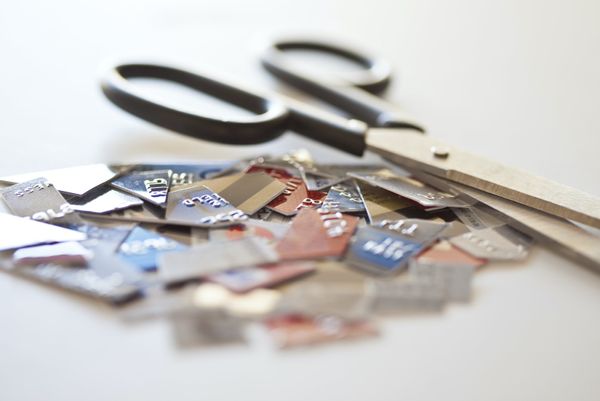Credit scores help lenders avoid bad debt by finding the most creditworthy borrowers. There are many different things that can affect a credit score.
As of 2019, the average American has a FICO credit score of around 700. This score goes up and down depending on a person's behavior, and will most directly affect the interest rate you are eligible for when opening a line of credit.
Take a look at this list of what can hurt your credit score.
What's a Credit Score?
A FICO score is a three-digit ranking from 300 to 850 which measures your creditworthiness. There are three major bureaus that issue credit scores: Equifax, Experian, and Transunion.
Lenders request your credit score from one or all of the credit bureaus when you apply for things like loans, lines of credit or credit cards. Credit bureaus don't just offer your credit score to lenders.
You can always get a free credit report to get the basics, but creditors who want a closer look at your financial history will examine your detailed spending habits. These additional analytics services are the main way credit bureaus earn revenue, but if you want to see the same level of detail they see, you should expect to pay an extra fee when you check your credit report.
Credit scores are updated every thirty days when each of your current lenders reports to the credit bureaus. They communicate any late payments, over the limit fees or account closings to the bureaus.
Most late payments aren't reported until after the delinquency goes beyond thirty days. Accounts that are closed are either marked as 'good standing' or 'bad standing.'
What Lowers Your Credit Score?
When your creditors report to the credit bureaus, your repayment habits contribute either to raising or lowering your credit score. Here are the top factors that can lower your credit score:
Late Payments
One of the easiest ways to damage your credit score is to not pay your bills on time. A good credit score goes hand-in-hand with showing a responsible payment history, since it makes up 35 percent of your credit score. Most creditors, such as auto loans and student loans, don't report a payment as late until after 30 days, but the number of days can vary and should be listed in the terms and conditions of your loan, contract or lease.
There might be additional notes to your account if you are paying according to a payment arrangement. For example, if you contact a creditor to arrange a payment beyond the thirty-day mark, your account will still report as late but with a 'pays as agreed' note.
These notes are helpful for lenders in determining the context of the late payment. A temporary financial hardship may lower your credit score, but a new lender can see your desire to take responsibility during a setback.
High Credit Utilization
Using too much of your available credit will lower your credit score. Your credit utilization ratio includes each of your accounts and all of your accounts as a whole.
Keep your credit card balances under 30 percent of the total available credit. For example, if you own a credit card with a $10,000 limit, avoid carrying a balance of more than $3,000.
The closer you get to meeting your credit limit, the more the penalty to your credit score. Aim to pay your statement balance in full each month to avoid debt creep.
Credit Inquiries
Applying for new credit causes your credit score to drop. There are exceptions to this rule.
When shopping for a loan for a specific purpose like buying a home or car, your credit score won't drop if the inquiries all happen within thirty days. You also receive less penalty to your credit score when shopping for the same type of loan.
The biggest hits to your credit score would come in extreme scenarios like if you were applying for a new credit card or retail line of credit every month. This is a red flag for lenders who look for borrowers with conservative spending habits.
Too many accounts leave you vulnerable to overextending your credit. In some cases, like when applying for a mortgage, lenders won't approve a borrower who applies for any new credit while going through the loan process.
Closing Accounts
Closing inactive accounts can be bad for your credit score. It's important to maintain all credit accounts in good standing because it lowers your overall credit utilization.
Use the card periodically to prevent the creditor from declaring your account inactive. An inactive account won't be reported to the credit bureaus and is at risk of being closed by the creditor.
Closing accounts also shortens the amount of time you own an account. A long, active account history means a higher credit score as long as your account is in good standing.
Improving Your Credit Score
The biggest factors that impact your credit score are payment history and the total amount owed. Together, these two factors account for 65 percent of your credit score.
The next most important is the length of credit history. The longer you keep your accounts open, the easier it is to raise your credit score.
Length of credit history accounts for 15 percent of your credit score. The remaining factors are types of credit and new credit.
Keeping a good mix of loan types keeps your credit score rising each month. For example, car loans, mortgages, installment loans and credit cards are a good variety to have.
A borrower with only credit cards or only a car loan doesn't have a credit history diverse enough to determine creditworthiness. Time and experiencing managing debt well will eventually get your credit score into your desired credit ranking.
The Deciding Factor
The deciding factor of what lowers your credit score is your behavior. Giving in to the temptation to spend beyond your means will eventually lead you into a debt trap.
Changes in your behavior is something a credit score attempts to predict. The more data a credit bureau has to work with, the easier it is to decide whether you are worthy of new credit.
Lenders extend credit to you with the assumption you understand how credit works and can repay a debt on time.






